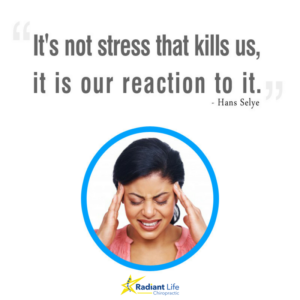Stress: The Silent Killer
The silent killer? No, we are not talking about high blood pressure. Think it’s a little dramatic to call stress the silent killer? Not if you understand what chronic stress does to our bodies.
If you are a living human being, then you experience stress daily. Some people have more than others, but we all experience at least some level of stress every single day. The question is whether we can deal with it or not. Stress comes in lots of forms. We have stresses in our relationships, finances, jobs, health, etc. 75% of American adults reported moderate to high levels of stress within the past month.
The sympathetic nervous system controls our fight or flight response, aka stress response. We don’t consciously control this response. It happens automatically. This response as a short-term response can be very beneficial. If we were confronted by a bear in the forest, then this response would provide us with what we needed to run away or defend ourselves. In a more realistic example, short-term stress can help us produce results in time when we are facing a deadline at work. However, long-term, chronic stress can wreak havoc on our health. The Mayo Clinic estimated that stress is the cause or exacerbates 80% of serious illnesses. Chronic sympathetic nervous system activity has been shown to increase the risk of developing heart disease, cancer and diabetes. The parasympathetic nervous system is our healing phase. We need balance between the systems because we cannot heal and defend ourselves at the same time. In our stressful lives, it is important to break that sympathetic dominance and activate our parasympathetic system.
How to Activate the Healing Phase
- Be Mindful: Take time to quiet your mind and unplug from your busy schedule. It could be meditation, yoga, deep breathing, reading, prayer, etc. Enjoy some “you time” though. Make it a priority, not a luxury.
- Move Your Body: Exercise has been shown to be very effective in reducing the negative effects of stress. Motion can influence your emotions so get off the couch and walk, bike, work out, etc. If the weather is nice, exercising outdoors in nature can be extra stress relieving.
If you or someone you know is struggling with chronic stress, then we encourage you to schedule an examination where we can determine your Wellness Score. We can show you how the stress is affecting your physiology and how we may be able to help. Call us at 215-259-5100 to schedule an appointment!
